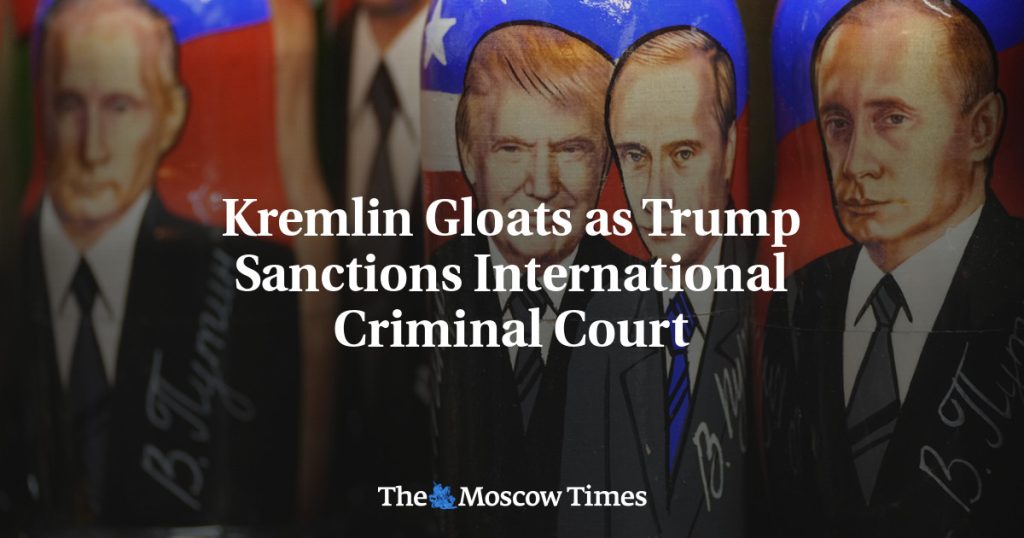Russian Officials Celebrate Trump’s Sanctions on International Criminal Court
Introduction: A Strategic Victory for Moscow
Russian officials are rejoicing over U.S. President Donald Trump’s decision to impose sanctions on the International Criminal Court (ICC), a move they believe significantly weakens the court’s global influence. The sanctions, announced after a meeting with Israeli Prime Minister Benjamin Netanyahu—who is also wanted by the ICC—target individuals assisting ICC investigations involving American citizens or allies. For Moscow, this is seen as a strategic victory that undermines Western efforts to isolate President Vladimir Putin and his inner circle on the international stage. The Kremlin views the sanctions as a direct blow to Ukraine’s allies, who have been pushing to hold Putin accountable for alleged war crimes, particularly in the context of the conflict in Ukraine.
While the Russian government has publicly downplayed the significance of the sanctions, behind the scenes, high-ranking officials are celebrating what they describe as a "gift to Moscow." The sanctions are perceived as a lifeline for Putin and his associates, who have been under increasing pressure from the ICC. This marks a stark shift from the panic that gripped the Kremlin just two years ago when the court issued an arrest warrant for Putin himself, accusing him of involvement in the illegal deportation of Ukrainian children.
The ICC’s Warrants and Moscow’s Initial Panic
In 2023, the ICC issued a warrant for Putin’s arrest, along with Maria Lvova-Belova, Russia’s children’s rights commissioner, over allegations of forced deportations of Ukrainian children. This move sent shockwaves through the Kremlin, prompting an emergency meeting to assess the potential fallout. Putin, known for his intense focus on personal security, was forced to cancel key foreign trips, including a high-profile appearance at a BRICS summit in South Africa, an ICC member state. The situation was further complicated when the court later added Defense Minister Sergei Shoigu and Chief of the General Staff Valery Gerasimov to its wanted list for their alleged roles in attacks on Ukraine’s energy infrastructure.
The Kremlin retaliated aggressively, issuing arrest warrants for ICC judges and prosecutors involved in the case and criminalizing cooperation with the court. Dmitry Medvedev, former Russian president and now a staunch supporter of the war in Ukraine, even threatened a nuclear strike on the ICC’s headquarters in The Hague. These actions underscored Moscow’s determination to defy the court’s authority and protect its leaders from accountability. However, the warrants also limited Putin’s ability to travel freely, raising concerns about his international standing.
Trump’s Sanctions: A Game-Changer for Russia
Fast-forward to 2024, and the mood in Moscow has shifted dramatically. With Trump’s sanctions in place, Russian officials believe the ICC’s ability to enforce its warrants has been significantly weakened. The sanctions impose financial and visa restrictions on anyone aiding ICC investigations targeting American citizens or allies, effectively creating a chilling effect on the court’s operations. While the sanctions do not directly absolve Putin or other Russian officials of the charges against them, they are seen as a strategic blow to the ICC’s credibility and effectiveness.
For Russia, this is a bolt of good news. Kremlin insiders have described Trump’s move as "great news" and "a gift to Moscow," arguing that it puts the ICC in its place and reduces the pressure on Putin and his inner circle. The sanctions are also seen as a political lifeline, enabling Russian leaders to regain some of the international maneuverability they lost after the ICC warrants were issued. One Russian diplomat told The Moscow Times that the sanctions would prevent a repeat of the "BRICS summit fiasco," where Putin was forced to cancel his appearance due to the risk of arrest.
Putin’s Renewed Confidence on the Global Stage
Putin has already begun testing the waters of international travel once again. In September 2024, he made his first trip to Mongolia since the ICC issued its warrant, marking a symbolic return to the global stage. Mongolia, which recognizes the ICC’s jurisdiction, posed a potential risk, but Putin’s visit went without incident. This trip was seen as a calculated move to demonstrate that the ICC’s warrants no longer carry the same weight, thanks in part to Trump’s sanctions.
Current and former Russian officials have dismissed the ICC’s efforts to hold them accountable, with one high-ranking Kremlin official bluntly stating, "We don’t give a damn." This confidence reflects a broader shift in Moscow’s attitude toward the court. While the ICC’s warrants once caused palpable fear and divisions within the Kremlin, they are now viewed as toothless in the face of U.S. sanctions and Russia’s own retaliatory measures.
Conclusion: The Implications of ICC’s Weakened Influence
The celebration in Moscow over Trump’s sanctions on the ICC highlights the intricate web of geopolitics at play in the global justice system. For Russia, the move is not just about目前ic immunity for its leaders but also about reclaiming its international influence. By undermining the ICC’s authority, Moscow hopes to create a more favorable environment for its leaders to operate without the stigma of war crimes allegations.
The broader implications of the sanctions are equally significant. They signal a growing divide between the U.S. and its traditional allies over the role of international institutions in holding leaders accountable. For the ICC, the sanctions represent a major setback in its efforts to uphold global justice. As the court’s influence wanes, leaders like Putin may feel emboldened to act with greater impunity, raising concerns about the erosion of international law and the rise of a more fragmented world order.
In the end, Trump’s sanctions on the ICC have handed Putin a much-needed political victory, allowing him to navigate the international arena with renewed confidence. Whether this marks a permanent shift in the balance of power remains to be seen, but for now, Moscow is savoring its win.












